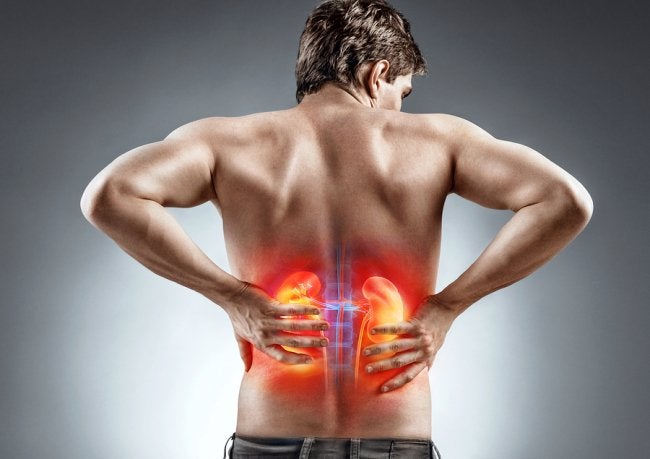-
Detecting Kidney Cancer

You have two kidneys located deep within your lower back, on either side of your spine. Their job is to remove waste products from the bloodstream, which are then expelled as urine. As with other cancers, the sooner a urologist diagnoses kidney cancer , the better. Early treatment can lead to a more favorable outcome.
Signs and Symptoms of Kidney Cancer
In the absence of symptoms, kidney cancer can be tricky to detect during routine physical exams. Family care doctors can palpate certain areas of the body to check for abnormalities. Women can receive breast exams, for example, to check for possible tumors. Unfortunately, this isn’t possible with the kidneys because they are too far beneath the skin’s surface. Instead, the detection of kidney cancer relies on the patient’s observations and risk factors. Talk to your doctor if you notice some of these possible signs of kidney cancer:
- Bloody urine
- Unexplained low back pain
- Loss of appetite
- Fatigue
- Persistent fever not caused by an infection
- Anemia
- Unintentional weight loss
Screening Tests for Kidney Cancer
Kidney cancer isn’t as common as skin or breast cancer, and there aren’t any routine screenings recommended for the average patient. Some people who are at a high risk of kidney cancer might have routine screening tests. Usually, a kidney cancer screening involves an imaging test, such as a magnetic resonance imaging (MRI) or computed tomography (CT) scan. Ultrasound is another possibility. Some urologists might also recommend periodic urine tests to check for the presence of blood.
Risk Factors of Kidney Cancer
These screening tests aren’t recommended for people at an average risk of kidney cancer. Consider asking your doctor about your risk factors. Some inherited conditions, including von Hippel-Lindau disease, can raise the risk of this cancer . A family history of one of these inherited conditions, or of kidney cancer itself, may be cause for a referral to a genetic counselor.
Kidney cancer is one of the many diseases we treat here at Urology Associates, P.C. Our sophisticated cancer treatment options in Nashville are combined with our personalized, patient-centered approach. If you’ve been referred to a urology specialist, you can get in touch with our friendly office staff at (855) 901-1338.
-
Working with Your Nurse Navigator

When you become a patient at Urology Associates, P.C., you might initially be surprised at the high level of personalized attention you’ll receive. Our urology team goes above and beyond to help men and women along their path toward healing. One of our professionals you may meet is a nurse navigator. Your nurse navigator is assigned to your case specifically to guide you from diagnosis to treatment to follow-up.
Your nurse navigator will make sure you fully understand your diagnosis and treatment options. Your urologist and nurse navigator will carefully coordinate your care, and the nurse navigator will ensure your additional appointments for testing and treatment are made in a timely fashion. Our nurse navigators are available to assist patients with the following conditions: Stress urinary incontinence, fecal incontinence, overactive bladder, benign prostatic hyperplasia (BPH), and prostate cancer.
If you have any questions about working with your nurse navigator or urologist in Tennessee, you can get in touch at (855) 901-1338. Urology Associates, P.C. is proud to be a trusted provider of high-quality medical care for Tennessee residents.
-
How Do Kidney Stones Form?
Kidney stones are a particularly painful urologic condition, although significant medical advancements give patients more treatment options than ever before. You can hear about some of them when you watch this video, which features a board certified urologist at Urology Associates, P.C.
Dr. Charles Eckstein explains that kidney stones form when there is a high concentration of crystals in the urine. Over time, these crystals can develop into stones, which may remain small or grow larger. Patients who are treated for kidney stones can work with their urologists to manage their risk factors, which can help prevent recurrent stones.
Kidney stones are one of the many medical conditions treated at Urology Associates, P.C. Patients with kidney stones who live in Tennessee can call us at (855) 901-1338 to request a prompt appointment with an experienced urologist.
-
Signs of Reduced Estrogen Levels in Women

It’s natural for women to experience a significant decline in estrogen levels later in life. Some women suffer from early estrogen deficiency, well before they’re expected to go through menopause. Although a decline in estrogen is natural, it can be problematic for a woman’s sexual health and overall health. One common symptom is vaginal dryness and painful sexual intercourse. Women may notice that they get urinary tract infections (UTIs) more readily. This is due to the thinning tissues of the urethra.
Other possible indicators of low estrogen levels include atypical fatigue, problems concentrating, and depressive symptoms. Mood swings, hot flashes, headaches, and breast tenderness can also occur. As women approach menopause, their periods become irregular or periodically absent. Headaches or the worsening of pre-existing migraine headaches are also common.
The Women’s Institute for Sexual Health (WISH) at Urology Associates, P.C. offers specialized care and a sensitive, personalized approach for women experiencing sexual health issues in Tennessee. Call (615)250-9265 for an appointment.
Recent Posts
categories
- Uncategorized
- Bladder Cancer
- Women's Sexual Health
- MonaLisa Touch
- Urology
- Urologist
- Erectile Dysfunction
- Kidney Cancer
- Incontinence
- Prostate
- MonaLisa Touch Laser Treatment
- Kidney Stones
- Urinary Tract Infections
- Event
- Sexual Dysfunction
- Testicular Cancer
- Prostate Cancer
- Urology Surgery Center
- urinary incontinence
- vaginismus
- noncoital pain disorder
- Hypoactive Sexual Desire Disorder
- Infographic
- provenge
- Xofigo
- robotic surgery
- hormone replacement
- diabetes
- renal cell carcinoma
- pelvic pain
- hematuria
- sexual health
- chronic testicular pain
- premature ejaculation
- Men's Health Clinic
- Dr. Melvin Seard
- Interstitial Cystitis
- vasectomy
- overactive bladder
- vaginal atrophy
- nocturia
- bladder infections
- urethral strictures
- Acute Epididymitis
- low sex drive
- circumcision
- pelvic floor dysfunction
- Peyronie's Disease
- prostatitis
- female sexual dysfunction
- varicocele
- difficult urination
- low libido
- PSA levels
- male fertility
- penile prosthesis
- prostatic intraepithelial neoplasia
- male infertility
- estrogen levels
- nurse navigator
- stress urinary incontinence
- vaginal yeast infection
- elevated psa
- painful sex
- adult circumcision
- epididymitis
- OAB
- kidney infection
- penile cancer
- pelvic organ prolapse
- Vasectomy Reversal
- bone health
- cystectomies
- clinical trials
- bloody urine
- Advanced Therapeutic Center
- WISH MedSpa
- neurogenic bladder
- WISH Team
- prostate biopsies
- BPH
- fecal incontinence
- lithotripsy
- osteoporosis
- kidney cysts
